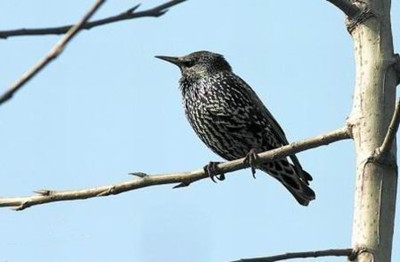(单词翻译:单击)
听力文本
This is Scientific American — 60-Second Science. I'm Emily Schwing.
Washington state is the country's largest producer of cherries and blueberries. The state's wine industry is second only to California's in value. But one non-native, nuisance bird is wreaking havoc.
[Sound of starling call.]
The European starling was brought to North America more than a century ago, by unwitting naturalists who wanted to introduce all the birds mentioned in Shakespeare's plays. Today, the starlings do hundreds of millions of dollars' worth of damage to Washington's crops. But one man has taken it upon himself to get rid of the birds—without killing them.
"We're not terminators. Our job description would be more like security guards."
Vahé Alaverdian, raptor wrangler. It's barely 6 A.M., but he's been out in a field of cherry trees in Yakima Valley since much earlier. He's working with a Peregrine falcon.
And as long as the falcon flies over these fields, fruit-loving birds like robins, finches and starlings will not. Fourth-generation fruit grower Mark Roy estimates Alaverdian's raptors save him a thousand dollars a day in otherwise lost produce.
"So, I mean it pays to come and to scare the birds away."

Birds of prey work where other traditional methods of bird abatement—like scarecrows, pyrotechnics and netting—fail. Alaverdian says even the most modern technology is no match for problem birds like starlings.
"People said 'oh, we're going to put you out of business. We've got drones, we're going to program these drones and then we'll fly them over blueberries.' And then what?"
Eventually, he says, starlings get used to the drones.
"It's just not something they're genetically programmed to avoid. It's good for 48 hours and then you need another tool."
Modern tools can decrease fruit damage to thirty percent, but Alaverdian says one client at a Vineyard in California has seen falconry bring that down to between five and seven percent.
It's a tried and true taloned tool, that protects even the lowest hanging fruit.
Thanks for listening for Scientific American — 60-Second Science Science. I'm Emily Schwing.
参考译文
这里是科学美国人——60秒科学。我是埃米莉·施温。
华盛顿州是美国最大的樱桃产地和蓝莓产地。该州的酿酒工业价值位居全美第二,仅次于加利福尼亚州。但是,一种非本土且令人讨厌的鸟类正在制造破坏。
(椋鸟的叫声)
一个多世纪以前,欧洲椋鸟由自然学家在无意中引入北美,这些自然学家想引入莎士比亚戏剧中多提到的所有鸟类。现在,这种椋鸟对华盛顿的作物造成的损失高达数亿美元。但是现在已经有一个人承担起了驱逐这种鸟类而不杀死它们的责任。
“我们不是终结者。我们的工作职责更像是保安。”
Vahé Alaverdian是一位猛禽牧人。现在刚刚6点,但是他早就到雅吉玛谷的樱桃田里了。他正在和游隼一起工作。
只要游隼在这些田地上空盘旋,那么知更鸟、雀类和椋鸟等喜爱水果的鸟类就不会出现在这里。马克·罗伊是第四代果农,他估计Alaverdian的猛禽每天能为他挽回1000美元的损失。
“我认为让它们把那些鸟吓走很值得。”
猛禽工作的领域在于稻草人、烟火、捕鸟网等传统驱鸟方法无效的地方。Alaverdian表示,即使最先进的方法也无法解决椋鸟的问题。
“人们说,我们可以取代你的方法。我们有无人机,我们可以设定无人机程序,让它们在蓝莓树的上空盘旋。可是结果是什么呢?”
他说,结果是椋鸟习惯了无人机的存在。
“因为那不是椋鸟生来就躲避的事物。这种方法在48个小时以内可能有效,但是之后你就需要换另一种工具了。”
现代工具可以将水果的损害率降低到30%,但是Alaverdia表示,加州葡萄庄园的一位客户表示,放鹰捕猎这种方法可以将损害率降低到5%—7%之间。
这是一个久经考验的方法,这种方法甚至可以保护悬挂在最下面的果实。
谢谢大家收听科学美国人——60秒科学。我是埃米莉·施温。
译文为可可英语翻译,未经授权请勿转载!
重点讲解
重点讲解:
1. get rid of 摆脱;甩掉;赶走;
例句:He believed that his manager wanted to get rid of him for personal reasons.
他认为经理是出于个人原因想开除他。
2. as long as 只要;
例句:I'm not particular how you do it as long as it gets done.
只要把它完成了,你怎么做我并不计较。
3. scare away 吓跑;
例句:People keep a dog to scare away thieves.
人们养狗来吓走小偷。
4. no match for 不能与…相比;敌不过…;
例句:I was no match for a man with such power.
我根本不是这样强大的男人的对手。
5. get used to sth./doing sth. 开始习惯于;
例句:They soon got used to driving on the left.
他们不久就习惯于靠左边行车。


